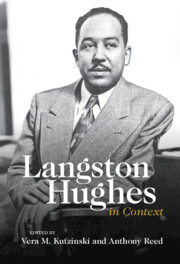Book contents
- Langston Hughes in Context
- Langston Hughes in Context
- Copyright page
- Contents
- Contributors
- Abbreviations
- Introduction
- Part I Singing America
- Part II The Global Langston Hughes
- Chapter 12 Langston Hughes and the Haitian Revolution
- Chapter 13 Taking Louise Bennett Seriously
- Chapter 14 Langston Hughes and Mexico
- Chapter 15 Langston Hughes in Spain
- Chapter 16 Langston Hughes in Cuba and South America
- Chapter 17 Langston Hughes, Colonialism, and Decolonization
- Chapter 18 Langston Hughes and Cultural Diplomacy
- Chapter 19 Langston Hughes in the Soviet Union
- Chapter 20 Translating Blackness
- Chapter 21 Langston Hughes and the Shanghai Jazz Scene
- Chapter 22 Langston Hughes’s Short Fiction in 1930s Korea
- Part III Afterlives
- Index
Chapter 15 - Langston Hughes in Spain
from Part II - The Global Langston Hughes
Published online by Cambridge University Press: 10 November 2022
- Langston Hughes in Context
- Langston Hughes in Context
- Copyright page
- Contents
- Contributors
- Abbreviations
- Introduction
- Part I Singing America
- Part II The Global Langston Hughes
- Chapter 12 Langston Hughes and the Haitian Revolution
- Chapter 13 Taking Louise Bennett Seriously
- Chapter 14 Langston Hughes and Mexico
- Chapter 15 Langston Hughes in Spain
- Chapter 16 Langston Hughes in Cuba and South America
- Chapter 17 Langston Hughes, Colonialism, and Decolonization
- Chapter 18 Langston Hughes and Cultural Diplomacy
- Chapter 19 Langston Hughes in the Soviet Union
- Chapter 20 Translating Blackness
- Chapter 21 Langston Hughes and the Shanghai Jazz Scene
- Chapter 22 Langston Hughes’s Short Fiction in 1930s Korea
- Part III Afterlives
- Index
Summary
This chapter explores Langston Hughes’s travels to Spain as a political correspondent for the Baltimore Afro-American during the Spanish Civil War in 1937. His journalism, featuring interviews with the Black volunteers in the Abraham Lincoln Brigade, was just one genre in a significant body of literary production that he completed in Spain. His time in Spain was a culmination of political activities related to labor, antiracist, anticolonial, and antifascist causes. The chapter examines how literary collaborations with the Spanish avant-garde group the Generation of 1927, and specifically his relationships with Rafael Alberti and María Teresa León, nurtured his production of original poetry, theater, and translations of Federico García Lorca’s Romancero gitano and Bodas de sangre. In Spain, Hughes experimented with multilingualism and intertextual adaptation across different mediums in order to show antifascist solidarity across linguistic, national, and racial boundaries.
- Type
- Chapter
- Information
- Langston Hughes in Context , pp. 160 - 170Publisher: Cambridge University PressPrint publication year: 2022

